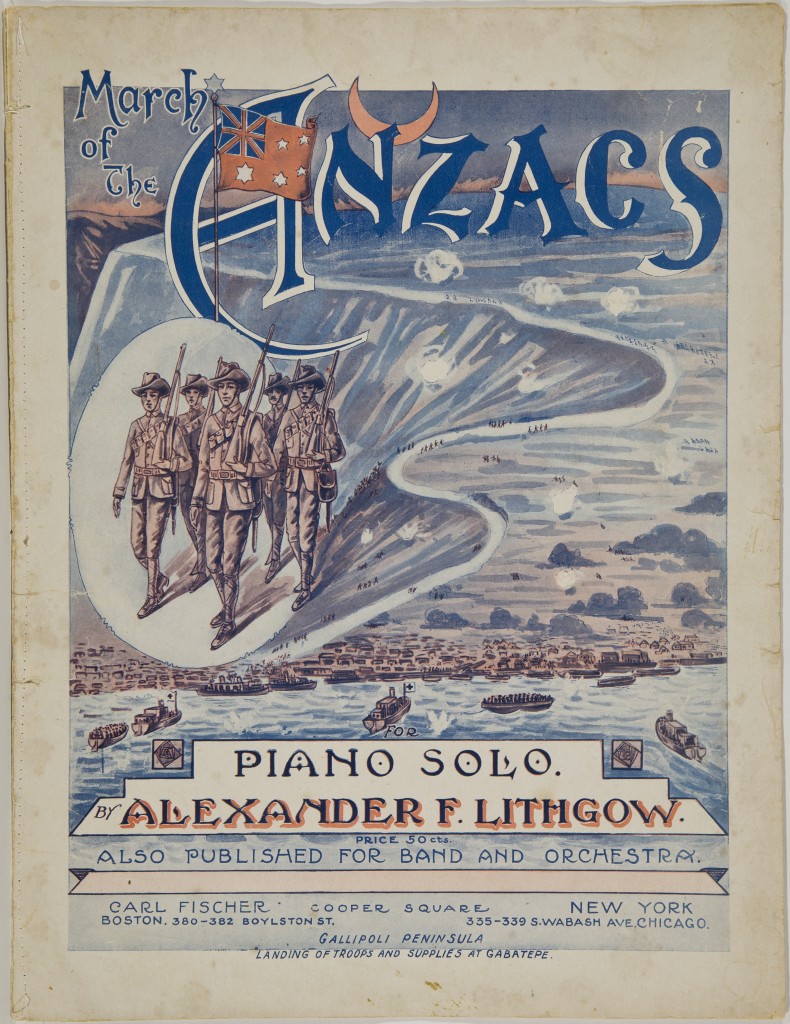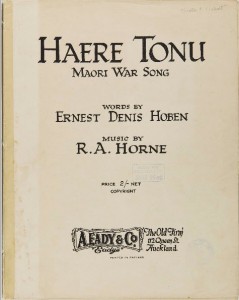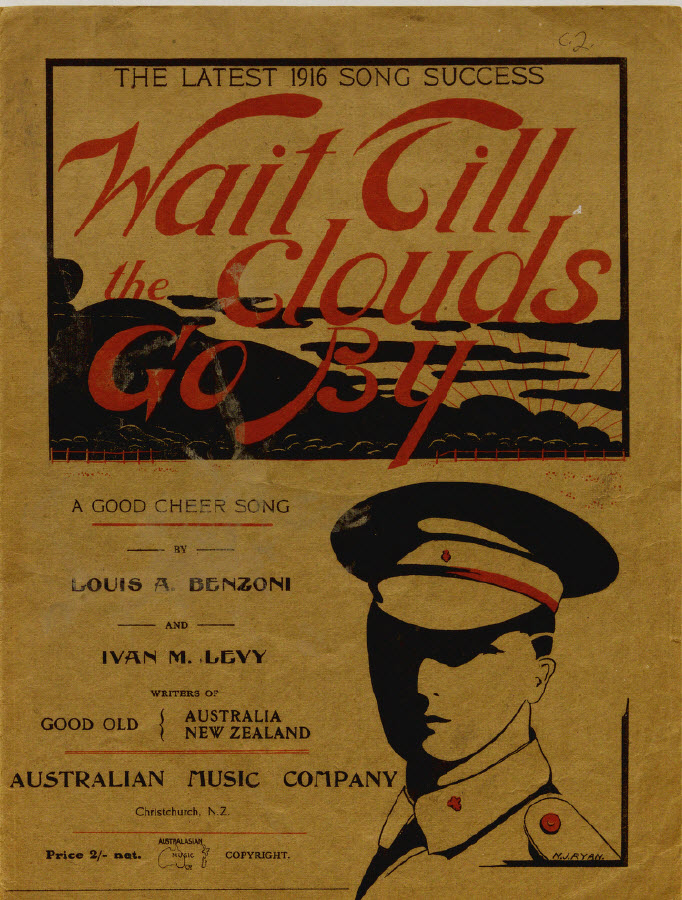 Post researched and written by Amanda Mills, Liaison Librarian Music and Audio Visual
Post researched and written by Amanda Mills, Liaison Librarian Music and Audio Visual
Music touches our lives in many ways, and often stays with communities and individuals for decades, even centuries after it was first written. Sadly, this is not often the case with music written for, and around, The Great War of 1914-1918 (WWI). While British songs like “It’s a Long Way to Tipperary” are still used frequently in film and television, and are in the public consciousness, many songs (both international and closer to home) have been forgotten. NZ written songs like “Call of the Southern Men”, “Haere Tonu” and “Thoughts” have disappeared from public and individual knowledge, but we are lucky sheet music has survived in collections both private and institutional. The Hocken Collections’ interesting WWI music sheets have been recently used for research, and are another way to view the narrative of war.
Many of the titles have been digitised, and are available to view and from Otago University’s OUR Heritage site http://otago.ourheritage.ac.nz/collections/show/60. More will be added in due course.
We have very little contextual information around some of these songs. Papers Past gives some information about the songs’ background and early performances. Some composer/lyricist information can sometimes be gleaned from military records if they served in the military. For example, the lyrics of Hampton Wood’s (H.W. Taman) “Keep On Keepin’ On”, subtitled “John Bull’s Advice for Those Who Can’t Go to the Front” suggest ways to help the war effort other than enlisting. Proceeds from sales went to the War Relief Fund, and the Prime Minister (William Massey) expressed the Government’s gratitude.
Known as ‘The ‘March King of the Antipodes’, Alex Lithgow wrote “March of the ANZACs”. Lithgow was born in Scotland, lived in Launceston, Australia, but spent about 20 years in New Zealand, primarily in Invercargill. “March of the Anzacs” was an upbeat, sprightly march, no doubt intending to inspire a patriotic swell of pride in the hearts of all who heard it. The lithographed cover illustrates the troops landing at Kabatepe (although the actual landing occurred further north at Ari Burnu), and presents an early image of the ANZAC troops.
Another treasure is “Haere Tonu: Maori War Song” by R.A. Horne and Ernest Hoben. The Press quoted the Christchurch Star’s view that the composition had caught the “true spirit and atmosphere of the haka”. The composer was the store manager of The Bristol Piano Company in Christchurch, and his advertisement prompted residents to call in to the store, where the song would be played for them. The lyrics (in both English and Maori) inspire patriotism, and encourage enlisting in the Expeditionary Forces, and looked to past Maori wars, as well as the current world war. “Haere Tonu” also had resurgence in the Second World War, associated with the 28th Maori Battalion.
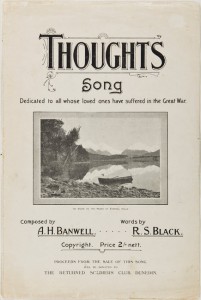 “Thoughts: Dedicated to all who whose loved one have suffered in the war” by R.S Black, and A.H. Banwell was published in 1919, and is the opposite of the optimistic, militaristic, patriotic attitude that most WWI music presented. Banwell was a returning soldier, who served as Lance Corporal in Gallipoli, and Sergeant in Cairo, before being discharged in August 1915, diagnosed with neurasthenia. He returned to New Zealand and deserted from Trentham in 1918, and was court marshalled in 1920.The lyrics by Black were possibly influenced by Banwell’s wartime experiences. “Thoughts” is very bleak in tone, presenting a darker view of life in the midst of war.
“Thoughts: Dedicated to all who whose loved one have suffered in the war” by R.S Black, and A.H. Banwell was published in 1919, and is the opposite of the optimistic, militaristic, patriotic attitude that most WWI music presented. Banwell was a returning soldier, who served as Lance Corporal in Gallipoli, and Sergeant in Cairo, before being discharged in August 1915, diagnosed with neurasthenia. He returned to New Zealand and deserted from Trentham in 1918, and was court marshalled in 1920.The lyrics by Black were possibly influenced by Banwell’s wartime experiences. “Thoughts” is very bleak in tone, presenting a darker view of life in the midst of war.
When memory’s merely a tragedy sad
And life a “procession of years”…
Then naught seems left to the sore-stricken soul
But a bed in the cold, cold ground
The proceeds of the sale of Thoughts went to the Returned Soldiers Club in Dunedin.
Australian and British WWI-related sheet music also feature in collections. One Australian war song in particular is directed at women. “Mother of Men: Dedicated to the Mothers of the men of the Expeditionary Forces” by Tom Armstrong was straightforward in message, the song leaning heavily on the image of the soldier’s close relationship with his mother. Similarly, the British “Somewhere in France, Dear Mother”, written in 1915 by Arthur Leclerq and Jack O’Connor was another wartime song that gained longevity. A patriotic song designed to rally the masses, the song highlighted sentimentality and national pride, again focussing on maternal pride and love.
A mother in tears it’s the first time she hears
From her boy who is fighting in the war
Still full of pride she dries her eye
And soon forgets her pain
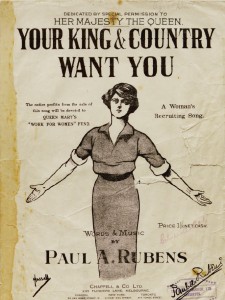 Another British song from the era that addresses women in a non-romanticised way is 1914’s “Your King and Country Want you: A Woman’s Recruiting Song” by Paul A. Rubens. This was a successful attempt to persuade more men to enlist for war, from the voice of a proud woman. Vocalist Vestra Tilley would perform the song at recruitment rallies, and men who failed to enlist at the end of the rally were given white feathers, symbolising cowardice, by children especially chosen for the task. Profits from the sale of 1914’s “Your King and Country Want You” went to Queen Mary’s Work for Women fund.
Another British song from the era that addresses women in a non-romanticised way is 1914’s “Your King and Country Want you: A Woman’s Recruiting Song” by Paul A. Rubens. This was a successful attempt to persuade more men to enlist for war, from the voice of a proud woman. Vocalist Vestra Tilley would perform the song at recruitment rallies, and men who failed to enlist at the end of the rally were given white feathers, symbolising cowardice, by children especially chosen for the task. Profits from the sale of 1914’s “Your King and Country Want You” went to Queen Mary’s Work for Women fund.
Amanda Mills


